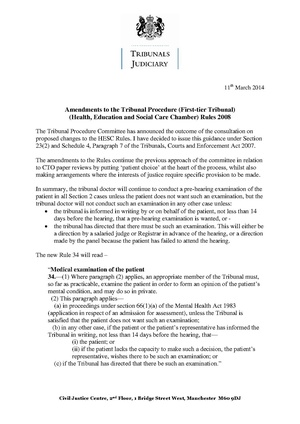Practice Direction and Guidance: Medical Examinations (11/3/14)
Medical examinations This document, dated 11/3/14, explains the regime in relation to medical examinations in cases received by the tribunal on or after 6/4/14. This page of the website contains a detailed summary of the changes.
Summary
From 18/6/13 to 10/9/13 the Tribunal Procedure Committee consulted proposals to change the medical member’s role. The outcome is contained in the following documents:
- Tribunal Procedure Committee, ‘Response to consultation on proposed amendments to the Tribunal Procedure (First-tier Tribunal) (Health, Education and Social Care Chamber) Rules 2008’ (March 2014). See Consultations#Mental Health Tribunal
- Tribunal Procedure (Amendment) Rules 2014
- Practice Direction and Guidance: Medical Examinations (11/3/14)
Rule 34 (medical examination of the patient) is replaced in its entirety, and sets out the three, more limited circumstances in which there will be a medical examination. Note that the examination in this new rule is of the patient rather than the medical records. Old text is in strikeout and new text in square brackets.
- (a) examine the patient; and
- (b) take such other steps as that member considers necessary to form an opinion of the patient’s mental condition.
(2) For the purposes of paragraph (1) that member may—
- (a) examine the patient in private;
- (b) examine records relating to the detention or treatment of the patient and any after-care services;
(c) take notes and copies of records for use in connection with the proceedings.
34.—(1) Where paragraph (2) applies, an appropriate member of the Tribunal must, so far as practicable, examine the patient in order to form an opinion of the patient’s mental condition, and may do so in private.
(2) This paragraph applies—
- (a) in proceedings under section 66(1)(a) of the Mental Health Act 1983 (application in respect of an admission for assessment), unless the Tribunal is satisfied that the patient does not want such an examination;
- (b) in any other case, if the patient or the patient’s representative has informed the Tribunal in writing, not less than 14 days before the hearing, that—
- (i) the patient; or
- (ii) if the patient lacks the capacity to make such a decision, the patient’s representative,
- wishes there to be such an examination; or
- (c) if the Tribunal has directed that there be such an examination.]
A form will be sent to section 2 and unrepresented patients explaining how to express their wishes.
The Practice Direction attempts to limit the scope of rule 34(2)(c) to the following scenarios only:
- The panel should, under amended rule 39, direct a medical examination if the patient fails to attend the hearing unless this is impractical or unnecessary.
- A salaried tribunal judge or Registrar can direct that an examination take place in advance of the hearing, as part of their case-management powers. The Practice Direction states: ‘Apart from a patient failing to attend, I do not expect panels at the hearing to direct pre-hearing examinations.’
- A general direction will be made so that the old regime applies to cases received by the tribunal before 6 April 2014.
Rule 37 (time and place of hearings) is amended so that 21 days’ notice of a hearing must be given. This is linked to the requirement (above) for requests for medical examinations to be made not less than 14 days before a hearing.
- (a) each party entitled to attend a hearing; and
- (b) any person who has been notified of the proceedings under rule 33 (notice of proceedings to interested persons).
(4) The period of notice under paragraph (3) must be at least [14 days21 days], except that—
- (a) in proceedings under section 66(1)(a) of the Mental Health Act 1983 the period must be at least 3 working days; and
- (b) the Tribunal may give shorter notice—
- (i) with the parties’ consent; or
- (ii) in urgent or exceptional circumstances.
Rule 39 (hearings in a party’s absence) is amended so that if a patient is absent there must be a medical examination unless this is ‘impractical or unnecessary’.
- (a) the requirements of rule 34 (medical examination of the patient) have been satisfied; and
- (b) the Tribunal is satisfied that—
- (i) the patient has decided not to attend the hearing; or
(ii) the patient is unable to attend the hearing for reasons of ill health.
(2) The Tribunal may not proceed with a hearing that the patient has failed to attend unless the Tribunal is satisfied that—
- (a) the patient—
- (i) has decided not to attend the hearing; or
- (ii) is unable to attend the hearing for reasons of ill health; and
- (b) an examination under rule 34 (medical examination of the patient)—
- (i) has been carried out; or
- (ii) is impractical or unnecessary.]
A new paragraph in rule 32 (procedure in mental health cases) is added to allow the tribunal to examine medical records.
In relation to this, the Practice Direction states that:
- Medical members should inspect patient’s records in a s2 case or where the examination has been directed over 14 days in advance.
- Medical members ‘are not expected to routinely inspect the patient’s records’ where there is no medical examination or the examination is because the patient failed to attend.
- If a party considers that the tribunal should consider any aspect of the records, the party should submit an extract to the tribunal in advance.
See also
Tribunal Procedure (Amendment) Rules 2014
Citation
[2014] MHLO 43
Type: Tribunal guidance🔍
Title: Practice Direction and Guidance: Medical Examinations
Organisation: Mental Health Tribunal🔍
Date: 11/3/14🔍
What links here:
- Tribunal Rules
- Consultations
- Tribunal Procedure (Amendment) Rules 2014
- Direction applicable to all Applications and References in Mental Health Cases received by the Tribunal on or before 4 April 2014 but not finally disposed of by the Tribunal on or before date (6/4/14)
- Medical examination of the patient - consultation
